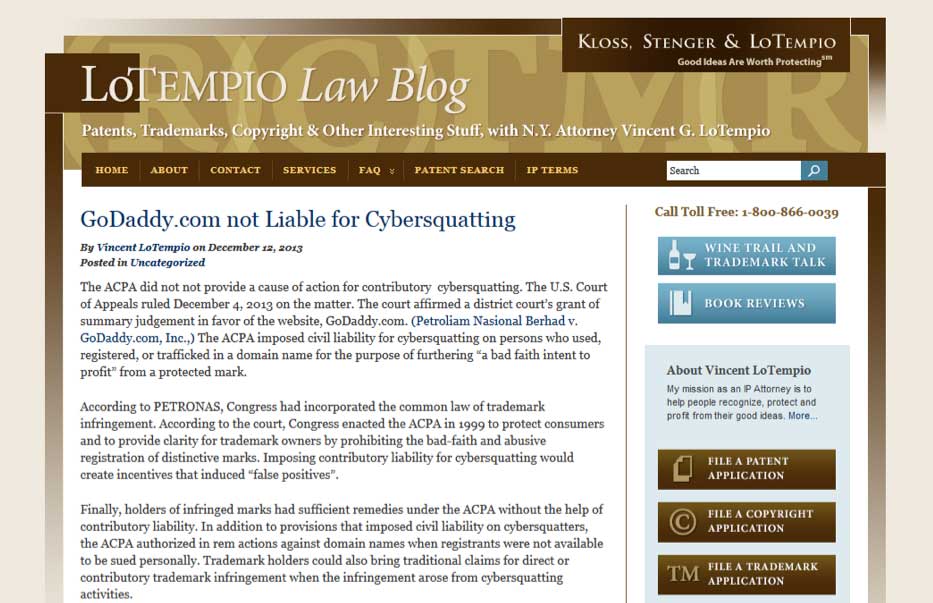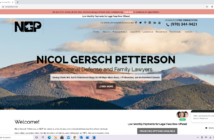What a few years of blogging have done for a local real estate lawyer and a federal patent attorney.
The interviewees

Vincent LoTempio from Kloss, Stenger, and LoTempio runs an intriguing blog at http://www.lotempiolaw.com/ about patent, trademark, and copyright law. Since he is a federally registered patent attorney, he blogs about patent laws for a nationwide audience, along with a specific focus on his hometown of Buffalo, New York.

Richard Vetstein, the founding partner at Vetstein Law, operates an insightful real estate blog focused on the state of Massachusetts. The blog discusses both commercial and real estate legal issues pertinent to buyers and sellers.
1. What is the purpose of your blog?
While their blogs may differ a bit in style and purpose, both of the attorney bloggers we interviewed use their blog as a means of finding clients and educating prospects on the law before they call. Both try to be a free resource that builds relationships before they speak with the prospects.
LoTempio: “The first thing about a blog is that it is your opportunity to reach out beyond your local community, to reach out to the whole country, and establish yourself as an expert in the field. I try not to use it as advertising, per se. Not like I am saying come to me I am a lawyer, but trying to share information about patent law.
Specifically, the blog serves three purposes:
- Provides information about stuff that is interesting and stuff that is new.
- Keeps me on top of my game.
- Helps Google find me. If people are searching for the subjects, then people can find me. My blog is the centerpiece of the search engine piece.”
Vetstein: “The purpose of my blog is to educate folks on Massachusetts real estate law. It’s written for both the layperson and the legal professional.”
2. Why did you decide to create a blog over other forms of internet marketing?
LoTempio: “I had a friend, his name was John Clutterbuck. He was an attorney out in Toronto. I met him through another friend. John was into blogging, and a blogger himself (anonymously). He explained that if you want to do it right that you need to do it through Lexblog. He introduced me to the guy who owned the place, Kevin O’Keefe from LexBlog. Kevin is a really great guy. When you meet him, you want to sit down and have a beer with him. That was exactly what we did. He basically teaches this idea of social media; of creating content, networking, and contacts.”
Vetstein: “I decided to create a blog back in 2009 after doing quite a bit of research on internet marketing. A blog was the natural choice for my skill set which is writing and explaining complex subjects in plain English. In my opinion, a blog is still the best form of internet content marketing for attorneys. I promote my blog posts through Facebook, Twitter, LinkedIn and JD Supra. I also use MailChimp which takes the posts and creates a weekly email blast.
3. What has been the greatest benefit from your blog?
LoTempio: “Well, I don’t know if it’s a lot. [The blog receives] anywhere from 2,000-6,000 visits per month, according to the analytic pages. Definitely traffic that comes through. As far as actual business that is hard to gauge. If they meet you and come to your office, and they are thinking about hiring you they can check out if there is anything about you online. Not something you can actually gauge….
One of the things that you do see is that you come up on Google searches for all things. If you type Buffalo patent attorney, I have come up 1st for the past 10 years, because of the blog and the site before that. Because of the blog, my law firm also comes up on the first page of Google. That never happened before the blog.”
Additionally, Vincent mentioned one specific example that happened to him early on in his blogging career. He wrote an article about the American Invents Act, and “it was a big deal, because the president signed it into law about a year or so ago. I wrote a very concise article about it. As a result, I came up very high in the Google searches for that particular term.
A woman was writing a post for her blog, for the New Post. Her post was about 10 Things that The President Should Do for His Second Term, and one of them was to sign the American Invents Act. She said if you want to find out more about the patents act check out LoTempio law, and I received 4-5,000 hits in a matter of hours.”
More specifically for those interested in the numbers, Vincent LoTempio gets a lot of calls from his blog.
“Whenever I ask people who call me locally, and I get 4-5 calls a week, I say, ‘where did you find me.’ Everyone says, ‘Google.’ So, I am assuming they would not find me through Google if I did not have a blog. The blog and the YouTube channel work really well.”
Vetstein: “There are many benefits of having a blog. The amount of clients and new matters I have generated from the blog is very robust. The ROI is just astronomical. The blog has also led to numerous press and speaking opportunities. Reporters call me frequently and I’ve been quoted in the Wall St. Journal, AP, Boston Globe and many other national and local outlets. The blog also makes me a better lawyer because it forces me to stay on top of the law.”
4. What is your greatest challenge in creating a blog?
LoTempio: “Everyone says, ‘How do you get the time to do it?’ I definitely can hit the wall, but I try to put a couple of hours a week aside to blog. I ask, ‘How do you not have the time to do it, just because of all the advantages?’
Then coming up with new ideas. I sign up to a couple of things for ideas. I used to sign up to Google Reader [application discontinued], and now other sites to sign up to RSS feeds [FeedBlitz is a good tool], as well as Twitter.
Everyone just tweets about the latest things that just happened. Like sipping from the fire hydrant, so much information out there. Just sip and take little pieces of it. I can just sit there and watch the tweets go by, and just pick out whatever comes by when you are sitting there.”
Twitter alone can provide an attorney with content for months at a time. Remember that there are over 500 million tweets per day. Even with a small fraction of those tweets focusing on legal issues, a lawyer has a goldmine of topics to discuss. A good resource for learning more about Twitter is Angela Heidt’s Twitter for Lawyers, found on this site.
Vetstein: “The greatest challenge is just to keep writing frequently. A lot of attorneys start out strong, but then don’t add posts, letting their blogs die on the vine. Readers see that. My blog has 388 posts as of today. I try to write something weekly, and it’s usually on my laptop while watching the Red Sox, Celtics or Patriots.”
5. What is the one piece of advice you would give attorneys who are starting a blog today?
LoTempio: “All roads lead back to Rome. Use social networks like LinkedIn, Twitter, Facebook, and other low-hanging fruit to drive traffic to your blog. Don’t be afraid. Everyone is afraid of invisible things on the internet. If you have a stodgy website, then few people will call you.”
Vetstein: “I would tell other attorneys that if they aren’t willing to make the weekly commitment to blogging, then don’t do it. Also, don’t outsource the writing. People want to hear your thinking, your analysis, your experiences, and not some canned copywriter.
6. Are there any special things that a lawyer needs to know about blogging that other businesses might not think about?
LoTempio: “I had a client in Voice over Internet Protocol (VoIP), and had millions of dollars’ worth of business. It was all because the blog was bringing it in. He was writing reviews. He said, just keep writing articles.
Kevin O’Keefe said, ‘don’t worry so much about SEO and trying to fill in the meta-tags. If you write good content then they will come.’
Not so much as being noticed, as being noticed for the right things. Things that are interesting and help people. Being the first person out there, and to be on the cutting edge. No matter what your blog is about, as long as you write good stuff and from the heart, people will come.”
Vetstein: “A lot of lawyers aren’t good with technology, so they may need help learning the back end of blogging, or need to out-source the creation and design of the blog to a professional. I’m of the younger generation, so I created the blog myself with a little help from a graphic designer. I learned how to do some basic coding and SEO stuff. A lot of trial and error but I was just starting my own practice, so money was tight! Another thing about lawyers is they often are afraid of writing something controversial. I say don’t be afraid to speak your mind. No one wants a wallflower for an attorney.”
Putting it together
Blogging on a regular basis takes hard work. Most bloggers find that the first six months starting up a blog are the hardest, because you are building up a reputation during this time with the search engines and your readers.
However, the long-term rewards from blogging are many. The key is consistency. Both of the attorneys here have been blogging for years on a regular basis. They understand that their practice will not grow overnight with a blog. That is why they keep creating content and building relationships from their blog.
Two tips to take away
a. Track everything. The more you know your numbers, the more you will be able to improve upon your results. For those using WordPress, there are Google Analytics plugins to track traffic. Additionally, having a specific phone number for the blog will help you track conversions.
b. Leverage your blog for additional exposure. Both attorneys profiled here received additional traffic from press coverage.



